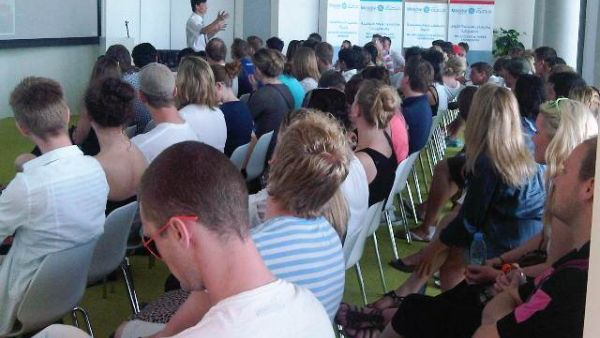Denmark students visit Masdar Institute

It was time for a lesson in eco-urban living for students of Aarhus School of Business, Denmark, who visited the Masdar Institute (MI) campus last week.
Eighty students, who visited MI on 28th April, witnessed first-hand the unique sustainable environment that exists at the institute.
On their first visit to Masdar Institute, the students were given a presentation by Assistant Provost Stephen Lee about the Institute and were later taken for a tour around the MI campus. They took a ride in the Personal Rapid Transit (the eco-friendly, driverless modes of transport at MI) and visited the Wind Tower area and Knowledge Center (library).
The students were curious to learn about the programs offered by Masdar Institute and were briefed about the construction and environmental issues related to living in a sustainable environment in MI.
Masdar Institute of Science and Technology is the world’s first graduate-level university dedicated to providing real-world solutions to issues of sustainability. The Institute’s goal is to become a world-class research-driven graduate-level university, focusing on advanced energy and sustainable technologies. Masdar Institute’s degree programs have been developed with the support and collaboration of the Massachusetts Institute of Technology (MIT).
Located in Abu Dhabi, Masdar Institute aims to support Abu Dhabi’s economic diversification by nurturing highly-skilled human and intellectual capital and partnering with industry leaders transforming the economy into a knowledge based one and enhancing the position of Abu Dhabi as a leader in global energy.
Masdar Institute’s wind tower rises 45m above the podium directing the cooler upper-level winds into the open-air public square at its base. The Masdar Institute building has been designed to minimize water consumption by using high efficiency appliances, low-flow showers, highly efficient laundry systems, a water tariff that promotes water efficiency, incentives, real-time monitoring, smart water meters that inform consumers of their consumption, treated wastewater recycling, high-efficiency irrigation and low-water use landscaping.
The waste management strategy at the Masdar Institute building seeks to minimize waste to landfill and maximize the resource potential of materials (recycling and reuse). Fossil-powered vehicles are parked outside the premises and personal travel takes place via the PRTs. The first phase of the Institute campus has 102 residential apartments.





